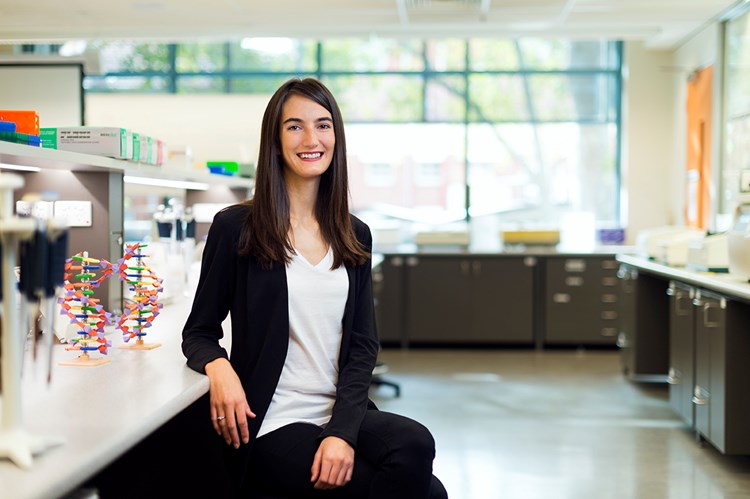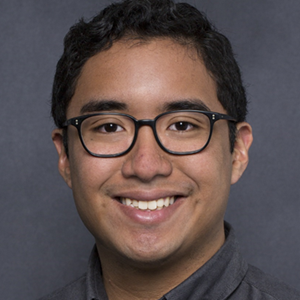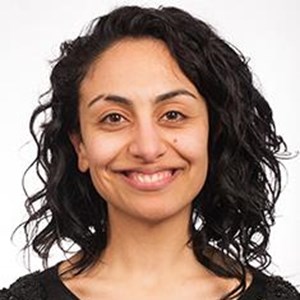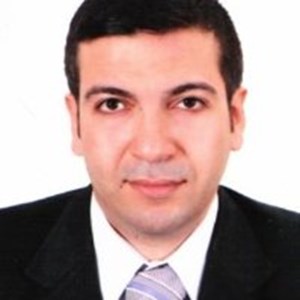
Australian Genomics’ PhD scholarships were awarded by Kathryn North, (Lead, Australian Genomics), at the Australian Genomics National Conference on Friday August 4. Recipients of the PhD top-up awards receive $10,000 per annum for three years toward their PhD research project. Seven top-up scholarships and a full scholarship were awarded.
Congratulations to the following outstanding PhD students:
Top-up scholarships
Renzo Balboa.The Australian National University (ANU) and the National Centre for Indigenous Genomics (NCIG). Title: Characterising structural variation within Indigenous Australian genomes. This project aims to characterise structural variation, and their population frequencies within Indigenous Australians. High-throughput assays for the detection of these variants will be developed using a combination of long- and short-read sequencing technologies. The roles of these variants in health and disease will be investigated, contributing to the understanding and clinical interpretation of genomic variation for Indigenous Australians. Renzo’s PhD research aligns with Australian Genomics data program (program 2). His PhD supervisors are Prof Simon Easteal (National Centre for Indigenous Genomics), Dr Gareth Baynham (Genetics Services of WA), Dr Hardip Patel (The ANU and NCIG), Dr Stephen Leslie (Murdoch Children’s Research Institute and NCIG) and Dr Ashley Farlow (the ANU and NCIG). |

Renzo Balboa
|
Royston Ong.The University of Western Australia (UWA) and the Harry Perkins Institute of Medical Research. Title: Investigating the feasibility of a public health system preconception carrier screening program in Western Australia. Preconception carrier screening is the screening of healthy asymptomatic adults for recessive mutations in their genome. Studies have shown that each of us is a carrier of a few mutations but are generally unaware of our carrier status until we have an affected child. Our study aims to determine the requirements for a screening program and to understand the public and healthcare provider’s knowledge and attitudes concerning the test. Royston’s PhD project aligns with Australian Genomics’ rare disease flagships as well as its national diagnostic network, health policy and economics and workforce training and education programs (Programs 1, 3 and 4) and his PhD supervisors are Prof Nigel Laing (Harry Perkins and UWA), Dr Gina Ravenscroft (Harry Perkins), Prof Vaille Dawson (UWA), Dr Hugh Dawkins (Office of Population Health Genomics, WA Department of Health) and Dr Gareth Baynam (Genetic Services WA) See a recent article on pre-pregnancy carrier screening featured in The Conversation, authored by Roytson Ong, Prof Nigel Laing and Dr Gina Ravenscroft (The University of Western Australia). |

Royston Ong |
Alicia Byrne.University of South Australia, SA Pathology and the Centre for Cancer Biology. Title: Diagnosis and discovery through whole exome and whole genome sequencing. Alicia’s research investigates using whole exome and whole genome sequencing as a ‘genomic autopsy’ to identify the molecular causes of congenital abnormalities and unexplained perinatal death. This approach provides affected families with a diagnosis, facilitating family planning and assisted reproductive options while at the same time allowing for the identification and investigation of genes critical in embryonic developmental pathways. Alicia’s PhD research aligns with Australian Genomics’ national diagnostic network program (Program 1) and the rare disease flagships. Alicia’s PhD supervisors are Prof Hamish Scott (SA Pathology & Centre for Cancer Biology); Dr Chris Hahn (SA Pathology & Centre for Cancer Biology), Karin Kassahn (SA Pathology & Centre for Cancer Biology), Daniel MacArthur (Broad Institute of Harvard and MIT). |

Alicia Byrne |
Harriet Dashnow.The University of Melbourne / Murdoch Children’s Research Institute. Title: Bioinformatics methods for the diagnosis and discovery of complex disease variants. Short tandem repeats (STRs) are 1-6bp of DNA sequence repeated in tandem. STR expansions are known to cause more than 25 Mendelian diseases including Huntington’s disease, spinocerebellar ataxias, myotonic dystrophy and the fragile X disorders. Detecting these expansions from short-read whole genome data is difficult, and existing diagnostic pipelines completely miss these variants. Harriet’s research involves developing new bioinformatic methods to detect pathogenic STR expansions at all known STR loci in the genome and applying this method to patient cohorts and have already identified a causal variant in an Ataxia family that had been unsolved for many years. Harriet’s PhD supervisor is Dr Alicia Oshlack (Murdoch Children’s Research Institute) and involves collaborations with Nigel Laing (Harry Perkins Institute of Medical Research & UWA) and Daniel MacArthur and Monkel Lek of the Broad Institute and Massachusetts General Hospital. |

Harriet Dashnow |
Fiona Moghaddas.The University of Melbourne / Walter and Eliza Hall Institute of Medical Research (WEHI). Title: Novel genes and mechanisms in monogenic autoinflammatory diseases. Fiona’s PhD is at the forefront of translational work, using CRISPR-Cas9 gene editing and other molecular techniques to model novel variants found through next generation sequencing of patients with suspected autoinflammatory diseases in order to determine and validate pathogenicity. Fiona’s research aligns with the work of Australian Genomics national diagnostic network (Program 1) and the Genetic Immunology flagship. Fiona’s PhD supervisors are A/Prof Seth Masters (WEHI), Prof Ian Wicks (WEHI) and Dr Dominic De Nardo (WEHI). |

Fiona Moghaddas |
Subotheni Thavaneswaran.The University of New South Wales (UNSW) and the Garvan Institute of Medical Research. Title: The forgotten cancer genome – the germline and its impact on cancer susceptibility and therapies. Subotheni’s PhD aims to characterise the true impact of the germline cancer genome on personalised therapeutic strategies. Clinically useful information latent within germline genomics informs cancer susceptibility, response to targeted drugs, and even likely toxicities to more conventional anti-cancer therapies. The projects that comprise the PhD highlight the various clinical applications of the germline cancer genome. Subotheni’s research aligns with Australian Genomics’ Cancer flagships and has international linkages to the ICGC Sarcoma Kindred Study. Her PhD supervisors are Prof David Thomas (Garvan Institute of Medical Research and the Kinghorn Cancer Centre) and Dr Dominque Hess (Garvan Institute of Medical Research). |

Subotheni Thavaneswaran |
Megan Barnet.The University of New South Wales (UNSW) and the Garvan Institute of Medical Research. Title: Genetic biomarkers for predicting response to immune checkpoint inhibitors in lung cancer. A subset of non-small cell lung cancer (NSCLC) patients have a durable response to treatment with checkpoint inhibitors. Our hypothesis is that these responders have one or more germ-line variants in peripheral tolerance genes. Whole genome sequencing can identify these variants, and may represent a complementary test to predict response to checkpoint inhibition. Megan’s research project aligns with Australian Genomics national diagnostic network (Program 1), functional genomics initiative and cancer flagship. Megan’s PhD supervisors are Prof Chris Goodnow (Garvan Institute); Prof Robert Brink (Garvan Instiute); Dr Tatyana Chtanova (Garvan Institute) and Dr Steven Kao (Chris O’Brien Lifehouse). |

Megan Barnet |
Full scholarship
Remon Azer.The University of Queensland and the QIMR Berghofer Medical Research Institute. Title: Integration of Variant Classification Algorithms in Sequencing Bioinformatics analysis and annotation pipelines. Using existing WES and WGS data from an endometrial cancer sample set as a demonstration sample, and WGS data arising from the Australian Genomics Cancer Flagship, this project will develop an automated system to annotate simpler (single nucleotide, small insertions-deletion) sequence variants for information currently included in internationally accepted clinical variant classification systems, including ACMG guidelines, to facilitate clinical grade classification of genetic variants in clinically reportable genes from whole exome and whole genome datasets. |

Remon Azer
|

